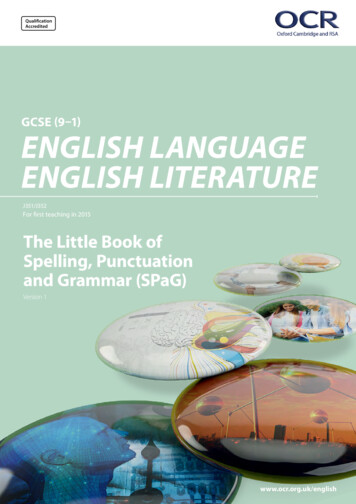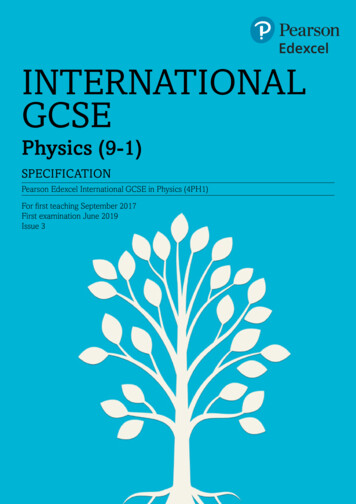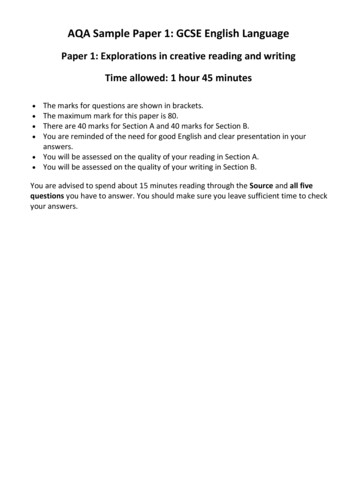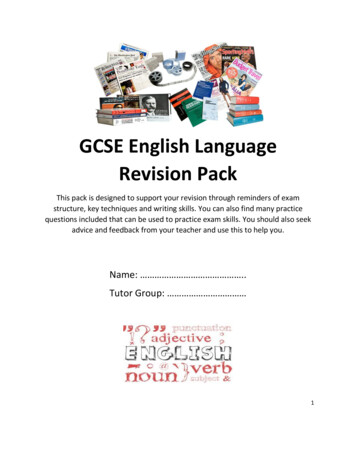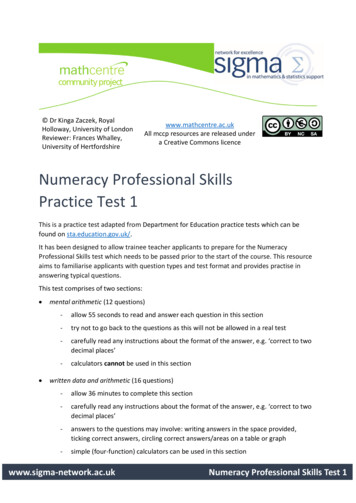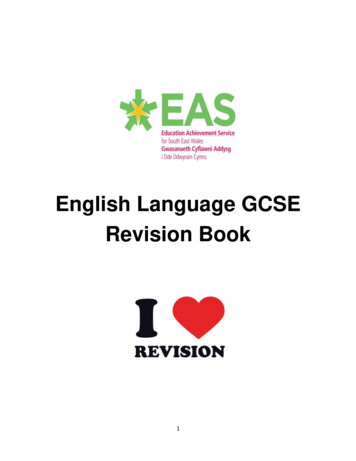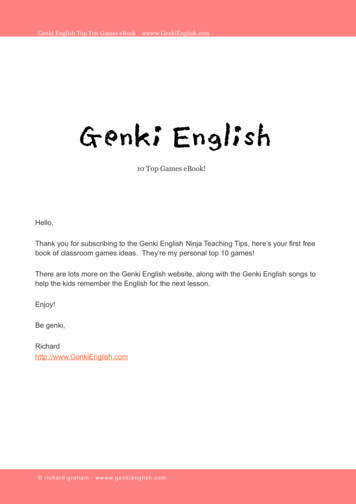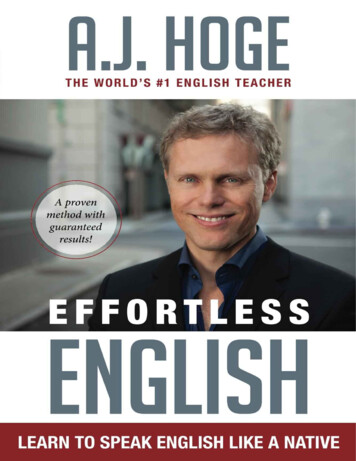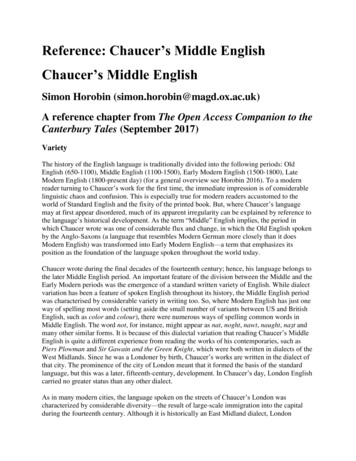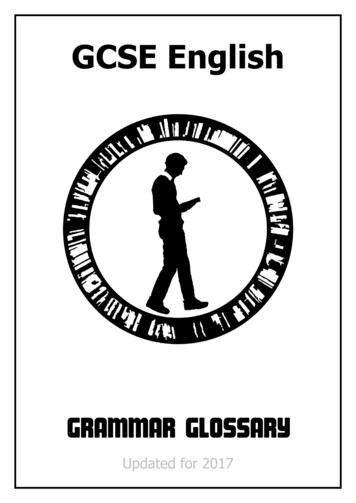
Transcription
GCSE EnglishGRAMMAR GLOSSARYUpdated for 2017
WORD CLASSESadjectiveadverbAdjectives give us extra information about nouns: the beautiful English teacher, theugly student. evaluative adjectives do exactly what you’d expect – they offer a judgement onthe noun being described.o The student’s work was awful. comparative adjectives usually end in –er or have more in front of them.Unsurprisingly, comparative adjectives make comparisons.o You are more stupid than him.o Nadine is prettier than you. superlative adjectives express the highest degree of a quality, and usually endin –est or have most in front of them.o You are the most stupid person I have ever met.o Mr Shovlin is the smartest man alive.Adverbs give us extra information about verbs and adjectives: he ran quickly, hewas especially ugly. A word ending in –ly is often an adverb (but not always – so becareful). adverbs of manner describe the way in which something is done.o The man kissed me passionately, and I bit his lip hard. adverbs of time tell us the time that something happens, or its frequency.o I’ll see you tomorrow.o I go to the gym regularly. particularizing adverbs focus attention on what follows them.o I am particularly annoyed but my day was mostly okay.You can also refer to particularizing adverbs as adverbs of degree. If theyintensify the meaning of a word, you can call them intensifiers.o I am so angry and you are very stupid. exclusive adverbs focus attention on what follows them, to the exclusion of allother possibilities.o You are only interested in yourself; it is just a question of when everyonefinds out.Other labels you might come across adverbs of place tell us, surprisingly enough, where something happens.o I left my keys somewhere.o Get here right now, you rat.2
conjunctiondeterminerConjunctions connect together words or clauses: Nadine and Sarah sold millions ofCDs as members of Girls Aloud, but they’ve had less success in their solo careers. coordinating conjunctions connect together words or clauses that have ‘equal’status.o I like you and you like me.o Mr Shovlin likes Girls Aloud but Mrs Smith prefers Little Mix. subordinating conjunctions connect clauses that have ‘unequal’ status.o If you eat cheese, I’ll spit on you.o I like children although I couldn’t eat a whole one.A determiner does exactly what it says on the tin – it determines the kind ofreference a noun or noun group has. Determiners always come before the nounthey determine: this is the best day of my life, this feeling is wonderful. demonstrative determiners are like demonstrative pronouns, but they don’ttake the place of a noun – they come before one.o Look at that idiot.o Have you seen this man? possessive determiners are like possessive pronouns in that they indicatepossession. Unlike possessive pronouns, they come before the noun beingpossessed.o This is my face.o I want to bite your eye out. the definite article is the name for the most commonly used word in theEnglish language: the.o You are the one that I want. nounthe indefinite article is the name for the second most commonly useddeterminer: a.o I don’t give a monkey’s.Nouns describe people, places or things: I went to the market and saw Gemmafilled with jealousy as someone kissed her boyfriend. concrete nouns are things that exist physically.o The table had four legs.o The aroma in the air was pungent. abstract nouns are things that do not exist physically – ideas, emotions, thatkind of thing.o My love for Krispy Kreme doughnuts knows no bounds.o His anger overwhelmed him. proper nouns almost always begin with a capital letter, and are the names ofpeople, places, organisations and so on.o Mr Ford loves to visit Egypt.3
collective nouns refer to groups.o Your class is filled with idiots.o The flock of animals follows us.Don’t confuse collective nouns with plural nouns (students is plural, class iscollective).prepositionPrepositions tell you how one thing relates to another: I’ll see you after dinner, I hidunder the table, I will kiss you on the lips.pronounPronouns can take the place of a noun in a sentence: Mr Shovlin loves Girls Aloudas he thinks they produce amazing music. personal pronouns usually take the place of people.o I went to work and met him and he took me to see her.When labelling personal pronouns, you should identify the person and numberof the pronoun. Person relates to whether the pronoun is in the first (I, me, we,us), second (you) or third (he, she, it, they, him, her, them) person. Numberrelates to whether the pronoun is singular (I, me, you, he, she, it, him, her) orplural (we, us, you, they, them). So, for example, them is a third person pluralpersonal pronoun. possessive pronouns show ownership.o This house is mine, not yours.They are similar to possessive determiners, but usually end with an S (with theexception of mine). Other examples include his, hers and ours. reflexive pronouns refer back to a previous noun or pronoun, and end in –selfor –selves.o You can suit yourself.o The dog wet itself.Other examples include myself, ourselves, yourselves, himself, herself,themselves, oneself. demonstrative pronouns allow us to indicate the thing or person we’rereferring to.o This is what I’m talking about.o That is why I love you.o These are the finest apples.o Those are the students who are irritating me. indefinite pronouns allow us to be – guess what? – indefinite.o Somebody has pooped in my shoe – does anybody know why?Other examples include anything, anyone, something, someone, nothing,nobody, none, no one.4
Other labels you might come acrossverb interrogative pronouns can be found at the start of interrogative sentences.o What did he say?o Who are you?o Why are you here?o Where did you come from?o When did you arrive?o Whatever are you wearing? relative pronouns immediately follow the noun to which they refer.o New York is the city that never sleeps.o This is the lady whom I love.Verbs describe an action, state or occurrence: I kicked him in the guts and feltgreat about it. dynamic verbs describe physical actions.o You punched him.o I smashed the ball.o I kissed him. stative verbs describe states or feelings.o I am irritated.o I love him with all my heart.o I want some chocolate. progressive verbs end in –ing and express action in progress.o He was hitting me.o She’ll be coming round the mountain when she comes. modal verbs are a type of auxiliary (or helping) verb and express necessity orpossibility.o You can see me later.o You should pay more attention.o I will deal with you in due course.o I could kill for a drink.With modals, it’s important to explain their function too. Do they expresspossibility (I might come out), certainty (I will come out), compulsion (You mustcome out), uncertainty (I may see you later)?5
PHRASESadjectivalAn adjectival phrase is a group of words that, together, function as an adjective in asentence. If your phrase is adjectival, its ‘head word’ – the word the phrase cannotlive without – will be an adjective. adverbialAn adverbial phrase is a group of words that, together, function as an adverb in asentence. If your phrase is adverbial, its ‘head word’ – the word the phrase cannotlive without – will be an adverb. nounI jumped aboard the bright red bus.Lutterworth College’s English Faculty is brilliant.English Language is easily the best A Level subject.A prepositional phrase is a group of words that, together, function as a prepositionin a sentence. They are typically made up of a noun phrase with a preposition. verbHe left the meeting very quickly.I bet you now understand phrases completely and utterly.A noun phrase is a group of words that, together, function as a noun in a sentence.If your phrase is a noun phrase, its ‘head word’ – the word the phrase cannot livewithout – will be a noun. prepositionalYou really are disgustingly ugly.The man was improbably large.Would you like to see me after your dinner?I found Mrs Greaves hiding in a bush.In a few days, Mr Smith will be downloading Girls Aloud’s entire discography.A verb phrase is a group of words that, together, function as a verb in a sentence. Ifyour phrase is a verb phrase, its ‘head word’ – the word the phrase cannot livewithout – will be a verb. He ran quickly down the stairs.She greedily gobbled the doughnuts.6
CLAUSESmainA main clause can form a complete sentence on its own. It must contain a verb. coordinateI like eating chocolate bars.You are a disgusting rat.I am amazeballs.A coordinate clause is a main clause in a compound or compound-complexsentence. I like eating Krispy Kreme doughnuts and you enjoy them too.Lutterworth College is a brilliant place but the students are vile.Where a coordinate clause forms a sentence on its own, you can call it a strandedcoordinate clause. subordinateAnd I loved it!But he’s an idiot.A subordinate clause is a clause that does not make sense on its own, and needs tobe paired with one or more main clauses to form a complete sentence. They areintroduced by subordinating conjunctions. As with other clause types, it mustcontain a verb. As a general rule, you can move subordinate clauses around in asentence without changing the meaning. Have a go with the examples below. Although I like children, I couldn’t eat a whole one.Mr Boulstridge wants to leave Lutterworth College because the students arevile.If you buy a Girls Aloud song, your life will be better.Subordinate clauses that start sentences can be called foregrounded subordinateclauses. Subordinate clauses in the middle of sentences can be called embeddedsubordinate clauses.You can label subordinate clauses even more specifically, if you’re brave enough togive it a go! concessive subordinate clauses concede something.o Miss Spray bought Mrs Wesley a Girls Aloud CD, although she couldn’treally afford it.o Even though I love him, he won’t reciprocate.o While I don’t agree with her, I respect her view. conditional subordinate clauses provide, unsurprisingly, a condition.o If you give me a chocolate bar, I’ll give you a kiss.o Provided you work hard, you’ll do well in Language.7
o Don’t phone me unless it’s an emergency. subordinate clauses of reason provide, quelle surprise, a reason.o Because he missed the train, Zayn was late.o I borrowed your tooth brush since you weren’t using it.o As I didn’t know the way to work, I stayed in bed. temporal subordinate clauses relate to time.o When you leave, shut the door.o I’ll ring you again before I go.o While you were sleeping, I stroked your face. relative subordinate clauses add additional information, and begin with arelative pronoun.o This is the woman who lives in a box.o Jennifer, who hadn’t slept for days, looked rough as hell.o The cat had wet the bed, which the dog found hilarious.8
SENTENCE TYPESsimpleA simple sentence contains one main clause. compoundA compound sentence contains two or more main clauses, often joined bycoordinating conjunctions. complex Although Mrs Greaves enjoys the music of Girls Aloud, she’d never buy one oftheir albums.If you want to get your girlfriend on side, buy her a slice of rat pie.Provided you work hard, you will do well in Language if you have the ability.A compound-complex sentence contains two or more main clauses and one ormore subordinate clauses. minorYou are a fat rat but I like you all the same.Martin likes to bake rat pie and Rachel enjoys munching on it.‘Call The Shots’ is Girls Aloud’s saddest song but ‘Sexy! No No No ’ is their best.A complex sentence contains one main clause and one or more subordinateclauses. compoundcomplexYou are a fat rat.I like to pierce my body.Miss Westwater likes to eat student casserole.Although my best friend is married, she can’t keep her hands off me and mywife is getting a little jealous.If you want to know the truth, I like to eat my Crème Eggs whole andregurgitate all of it minutes later.A minor sentence is one that is not grammatically complete. It may be missing asubject or a verb. In your dreams, buddy.Whatever.Working together – for lower costs and higher prices!9
SENTENCE FUNCTIONSdeclarativeDeclaratives are statements. imperativeImperatives are instructions or commands, and always begin with a verb. interrogativeYou adore Cheryl Fernandez-Versini (or whatever her surname is now).I think cheese is preferable to chocolate.Paris is the capital of France.Go to hell, you fat chicken wing.Leave this room immediately.Kiss me on the lips.Interrogatives are questions. Do you think Girls Aloud are amazeballs?Would you like cream with your coffee?Do I look like Sheldon from The Big Bang Theory?Be careful not to confuse interrogatives with declaratives that end with a tagquestion. For example: I like cheese, don’t you? is a declarative sentence with a tagquestion, whereas Don’t you like cheese? is an interrogative.exclamativeExclamatives exclaim – who’d have thought it? An exclamation mark usually signalsan exclamative sentence, but not always – so take care! Christ on a bike!Goodness me!Oh no!10
OTHER BITS AND BOBSactive andpassive voiceIn the active voice, the subject of a sentence (who comes first) is the do-er of anaction. Sarah kicked Stewart in the face.In the passive voice, the subject of the sentence is the done-to. Stewart was kicked in the face by Sarah.In both of the examples above, the same action is being described. However,Sarah is the subject in the first sentence and Stewart is the subject in the second.The passive voice allows us to leave out the by-phrase – that is, the do-er of anaction. For example, the second example could be written as Stewart was kicked,with the identity of the kicker kept concealed.ellipsisEllipsis has two meanings in English Language. It can refer to three dots ( ) or tothe missing out of a word or words in a sentence. It’s common in newspaperheadlines. euphemismanddysphemismA euphemism is a word or phrase that tries to avoid saying something unpleasant.A dysphemism is the opposite: a word or phrase that draws attention to theunpleasantness of its meaning. In the examples below, the euphemisms comefirst, with the dysphemisms following. hyperbole andmeiosisMissing man found alive.Shock decision rocks nation.I’m going to spend a penny. / I’m going for a slash.He passed away peacefully. / He dropped dead.The company downsized. / The company sacked loads of its staff.Hyperbole is exaggeration for effect. I cried my eyes out.He meant the world to me.Meiosis is the opposite – deliberate understatement. idiomOh? The 10,000 watch I bought you? Just a small token of my appreciation.The car’s written off? It was only a little prang!An idiom is a phrase whose meaning cannot be worked out from the meanings ofthe individual words that make it up. People who learn English as a foreign11
language often struggle to understand our idioms, even if they know ourvocabulary well. It’s raining cats and dogs.I’m going to take him to the cleaners.phoneticrenditionThis is when words are spelled as they sound. For example, Lestuh is how a lot ofyou pronounce Leicester.synecdocheand metonymySynecdoche (pronounced sin-eck-duh-key) is when a part of something stands infor a whole or the whole stands in for a part. Confused? Here are some examples. We need all hands on deck! (Hands refers to workers.)I’m going to buy some new wheels. (Wheels refers to a car.)I’ve got five mouths to feed. (Mouths refers to children.)The government made the decision. (Government here could refer to amajority of ministers – not necessarily all of them.)Metonymy is when one thing stands in for something else that it represents. syntacticparallelismThe White House stopped the law passing. (Here, The White House representsthe US government or the President.)Wall Street crashed again in 2008. (Wall Street represents the US bankingsystem.)This is when a writer or speaker repeats a sentence structure – usually forpersuasive effect. If we build it, they will come; if they come, we will succeed.Write about syntactic parallelism and you will impress the examiner. Impressthe examiner, and you will score high marks.This is when a writer or speaker makes use of the second person to ‘synthesise’ asyntheticpersonalisation relationship with the reader. You’ve tried the rest – now try the best!Working harder and smarter for a better future for you.Don’t assume all use of second person indicates synthetic personalisation; if thewriter or speaker already knows the audience, it’s not synthetic!triad/tricolonA triad or tricolon is a pattern of three words of phrases. For example: We came,we saw, we conquered.12
ANYTHING ELSE?13
14
15
Written by Stewart Shovlin Lutterworth College English Faculty 201716
7 CLAUSES main A main clause can form a complete sentence on its own. It must contain a verb. I like eating chocolate bars. You are a disgusting rat. I am amazeballs. coordinate A coordinate clause is a main clause in a compound or compound-complex sentence. I like eating Krispy Kreme doughnuts and you enjoy t

